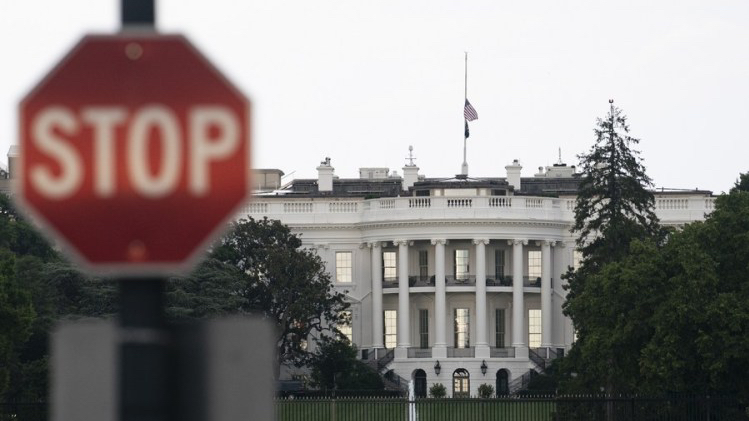
The White House and a stop sign in Washington, D.C., the United States, August 4, 2022. /Xinhua
The White House and a stop sign in Washington, D.C., the United States, August 4, 2022. /Xinhua
Editor's note: Keith Lamb is a University of Oxford graduate with a Master of Science in Contemporary Chinese Studies. His primary research interests are China's international relations and "socialism with Chinese characteristics." The article reflects the author's opinions and not necessarily the views of CGTN.
The recent 2023 Annual Threat Assessment of the CIA dedicates six pages to describing China-proposed initiatives such as the Belt and Road Initiative (BRI), the Global Development Initiative (GDI), and the Global Security Initiative (GSI) as promoting "a China-led alternative to often U.S. and Western-dominated international development and security forums and frameworks" where China "will use these programs and initiatives to promote modifications to international norms to favor state sovereignty and political stability over individual rights."
First, state sovereignty is enshrined in the UN charter which all members, including the U.S., signed up to. It is not a case of favoring, it is the fundamental international norm of the highest lawful international organization.
The problem then comes down to the implementation of sovereignty – not all states adhere to it and the U.S. is peerless in trampling this norm. This is perhaps why the GSI, which supports non-interference in sovereign affairs and seeks peaceful negotiated solutions to conflicts, by taking all rational interests into account, may seem challenging to the U.S. However, considering the GSI seeks a greater role for the UN in tackling a host of security issues it isn't about augmenting China's power vis-a-vis the U.S. but promoting the existing international order.
Second, "political stability" in contrast to "individual rights" is a false dichotomy because the rights of the individual rest on the foundation of political stability. With political stability comes development and through development, the individual right to be housed, clothed, and fed, along with a host of other rights such as education, consumption, and travel become available.
When it comes to these China-proposed initiatives, they augment Western development and security because peace and development offer boundless opportunities for all. Being initiatives that are voluntarily entered into, they belong to the world and increase global democracy. The framework used in the CIA report which describes China as challenging its "domination" while China "promotes" reveals the hegemonic mindset of the U.S.
To say the BRI challenges U.S. developmental frameworks is misleading. Before the BRI, there was no current comparable Western developmental project to compare BRI to. Instead, it was U.S. President Joe Biden's Build Back Better Plan (BBB), which, last year, Forbes described as "nothing more than an ambitious memory," which sought to challenge the BRI.
Thinking outside the box of competition, when it comes to BBB vs. BRI, there is no need for the U.S. to compete as both want the same thing - development, which, if anything, requires cooperation. Thus, the framing of developing the world in the name of great power rivalry is counterproductive.

Wang Yi, a member of the Political Bureau of the Communist Party of China (CPC) Central Committee and director of the Office of the Foreign Affairs Commission of the CPC Central Committee, answers questions at the Munich Security Conference in Munich, Germany, on February 18, 2023. /Xinhua
Wang Yi, a member of the Political Bureau of the Communist Party of China (CPC) Central Committee and director of the Office of the Foreign Affairs Commission of the CPC Central Committee, answers questions at the Munich Security Conference in Munich, Germany, on February 18, 2023. /Xinhua
While there is no need for the U.S. to have a separate BBB to rival the BRI even if it could implement such a project, it currently doesn't possess the political will to adequately cultivate the infrastructure capabilities to develop itself let alone the rest of the world. However, with a positive win-win mindset, the U.S. could join the BRI and play a prominent role in global development especially as, through increased cooperation, it would be able to master certain developmental processes.
With all this in mind, the U.S. must calmly evaluate why it is unable to offer development to the world. A rational historical view shows the U.S. post-WWII role in global development has been one of de-development through invasions and proxy wars, as well as maintaining political instability through coups.
From this perspective, the BRI challenges the U.S. model of keeping the world in ruins, which is the result of their military-industrial complex taking a leading role in U.S. capitalism. However, with a glass-half-full mentality, a developed Global South, with its dormant spending power awakened, is an unprecedented opportunity for U.S. businesses.
Considering China's values often mirror those publicly lauded by the U.S., when China raises a proposal the U.S. should not instantly dismiss it as out of hand. For example, the GDI is about staying committed to people-centered development and it focuses on practical cooperation in areas, such as poverty reduction, food security, COVID-19, financing for development, green development, industrialization, and the digital economy, to ensure that no country and no person is left behind. All these things augment individual rights.
Crucially, the GDI is not dreamed up in opposition to any U.S.-led Western framework because it arose as recognition of the challenges the world faces in implementing the 2030 UN Agenda for Sustainable Development. This is the very agenda that in 2015 the White House, under former President Barack Obama, celebrated saying, "through the adoption of this historic framework, the United States joins with countries around the world in pledging to leave no one behind by ending extreme poverty and prioritizing policies and investments that have a long-term, transformative impact and are sustainable."
Peace and development are values that all the world shares and ideas for solving related problems will increasingly come from the majority of humanity in the Global South. The U.S. Cold War mentality has led to a knee-jerk reaction of criticizing anything that comes out of China, but a closer look at what China proposes suggests that it doesn't seek to dominate the world and instead it is integrating these initiatives with the needs of the entire world and the UN order supported by the U.S.
(If you want to contribute and have specific expertise, please contact us at opinions@cgtn.com. Follow @thouse_opinions on Twitter to discover the latest commentaries on CGTN Opinion Section.)